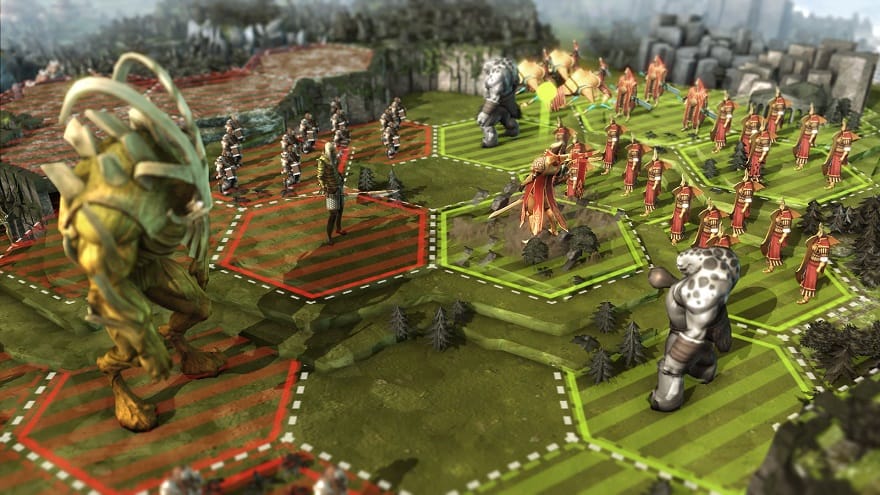Throughout his sprawling Dark Tower novels, Stephen King describes the world of Roland Deschain as having “moved on.” Roland’s memories provide glimpses of Mid-World’s former glory, but the contemporary Mid-World is dry and gray, sparsely populated with desperate folks driven into madness and despair. The specifics of what it means for a world to “move on” are left largely unexplored. In broad strokes, the gears at the center of whatever mechanism holds stuff together are winding down. In the cycle’s first volume, The Gunslinger, Roland wanders a wasteland of the mundane and the melancholy, not so much trying to save the world as waiting for it to sputter and die.
You might not expect to find much of Mid-World’s DNA in a game like Endless Legend, the fantasy-flavored 4X from French developer Amplitude Studios. The 4X genre (named by for the four primary player directives: eXploration, eXpansion, eXploitation, and eXtermination) tends to be tonally optimistic. Games like Sid Meier’s Civilization drop the player into the nascent days of a community’s development and direct them to cast their eyes toward a future full of promise. The color scheme, the musical score, and the whole presentation send a clear tonal message to the player: for those with ambition and grit, the future’s so bright, you gotta wear shades.
Call Endless Legend a 5X game. The extra X? Existential crisis.
Endless Legend flips the script. The factions crawling over the face of the planet Auriga aren’t waking up at the dawn of civilization; they’re witnessing its extinction. Their long histories are already recorded, and the richest chapters of those histories are finished. Some, like the subterranean Vaulters, were driven out of their homes by the cataclysms tearing Auriga apart and now face a hostile and unfamiliar environment. Others seem like symptoms of the world’s decay, like the insectoid Necrophages who kill to collect bodies in which to lay their eggs. No matter which clan you choose, your community’s elders foresee terrible changes and assure you that you must adapt or die. Each winter is longer than the last and more destructive to your ability to collect resources. And the other factions are each trying to assure their own survival in the changing world, often at your expense. This world, like Roland Deschain’s, has moved on.
The game manages to buttress its everything-is-fucked tone in numerous ways. The gorgeous orchestral soundtrack is full of melancholy violins, icy chimes, and driving tribal percussion. The color scheme is all low-tone greens and icy blues and dusty browns, creating the impression that Auriga exists in perpetual twilight. And specifically, Amplitude Studios have managed to bend the signature activities of the 4X genre to match the game’s thematic pessimism. Each faction is furnished with a series of quests to deliver the narrative and present the four X’s in a new context. Suddenly, you’re not just harvesting resources so that you can kick your opponents’ butts; you’re trying to construct the arcane mechanism that might save your people. You’re not raising cities just because that’s what you’re supposed to do; you’re flexing your military muscles to quiet troublesome critics within your council. You’re not sailing across the sea for the sake of clearing away the Fog of War; you’re colonizing new lands because if you don’t, you might never find the ancient ruins that contain your only hope of survival. Call Endless Legend a 5X game. The extra X? Existential crisis.

When Endless Legend borrows narrative tropes from the existing body of end-of-the-world fiction, it tends toward the total-downer end of the scale. The two-fisted bad-assery of Fallout or The Road Warrior is nowhere to be seen. And while Endless Legend may not have the nightmarish brutality of Cormac McCarthy’s The Road or the lonely philosophizing of Haruki Murakami’s Hardboiled Wonderland and the End of the World, it evokes both books in its conviction that living in Auriga is a matter of doing everything you can until the moment you’re out of options. But for me, the set of apocalyptic literature Endless Legend most often evokes is the work of the English poets writing in the aftermath of World War II. It’s tough not to think of Yeats writing “Things fall apart; the centre cannot hold” when the winters keeps getting longer and my population grows more and more unhappy. And when mission prompts keep reminding me that Auriga’s gradual changes are making my survival less and less feasible, I’m reminded of the closing lines of T.S. Eliot’s “The Hollow Men”: “This is the way the world ends. Not with a bang but a whimper.”
Even the victor is left to keep toiling away
That fatalism establishes Endless Legend as part of a very particular subgenre of apocalyptic fiction: the Dying Earth story, named for Jack Vance’s collection of interconnected short stories, The Dying Earth, in which small pockets of humanity eek out meager lives under a Sun that’s about to call it quits. In dying Earth stories, the rotten state of the world can’t be attributed to a giant cataclysmic disaster. The culprit is plain old inescapable entropy.
Which is why I was at first perplexed when the game didn’t really… end. Triggering any of the game’s eight win-states rewards the player with a victory screen that says little apart from, “Congrats, bro. Game won. Want to keep playing?” I still think this represents a missed opportunity for more narrative depth, especially in the case of the Wonder Victory achieved by completing your faction’s missions. But there’s poetry in the game just marching forward without regard for your supposed victory. Sure, you did better than the AI or the other players, but Auriga doesn’t care. Auriga just keeps marching forward, its winters growing longer and more severe. Even the victor is left to keep toiling away. Eventually, whether because of lack of economic strength, lack of available resources to support your growing population, or lack of will to persevere, you’re going to move on, just as Auriga has. That’s the way the world ends.





